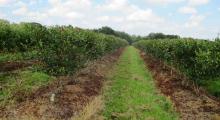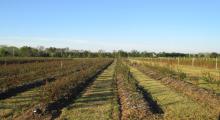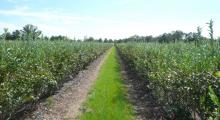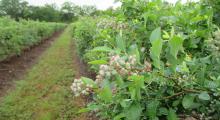Key Factors in Successful Blueberry Production
Solutions to Improve Profits
Establishment: One of the first considerations in blueberry farming is the soil chemistry at the site before any work has begun. A baseline soil test will provide invaluable information for a successful farm. Blueberries are very pH dependant for plant growth. Without the proper pH in starting a site there will be reduced plant growth, vigor, reduced yields, and eventually increased disease probability. Soil pH can be too low or too high. In either case it must be understood that the soil will try to return, over time, to the original pH before adjustments. Therefore, management of pH is a continual process throughout the life of the plant and is critical to success.
Established: If a location has been established or is in production the pH of the soil is a constant consideration as the availability of all nutrients present in the soil. What is used in the fertility program can and will be reduced to the plant if the pH is not in the 5.0 to 5.5 range. Phosphorus, potassium, and micronutrient availability may be confirmed with soil tests, but nutritional deficiencies can be present in the plant as ‘Hidden Hunger’ reducing top yield potentials or as moderate to severe deficiency symptoms. These symptoms can range from reduced vigor/yield to plant death.
Calcium Nutrition: Calcium nutrition is a key component to success of a perennial crop. Calcium is the most frequently overlooked macro element. The typical mild symptoms seen can range from quality loss caused by skin splitting to reduced shelf-life. More serious symptoms can include bloom abortion, improper fruit fill, disease, dramatically reduced yields, stunted plants, and root death.
Aluminum Toxicity: Aluminum is a non-essential element that can become a problem in low pH crop production systems. Aluminum becomes rapidly available as the pH drops below 5.0 causing root terminal decline, stunted plants, droughty plant appearance with adequate water, reduced yields, and plant death at extremely low pH.
Nutrients: Proper nutrient delivery is critical in producing any crop. It is important to understand which elements move, how they move, when they should be applied for maximum availability, what methods of delivery or types of application should be used for maximum availability, and how much should be applied. For example, phosphorus is fairly immobile and if applied dry should be put out early the fall before the next year’s production.
Water Quality: Water quality is an important consideration when developing a blueberry production site. It is important to consider this factor when making the significant investment of establishing a farm and a simple quality test should be conducted. Water quality not only can dramatically effect plant growth, but also can affect fertigation effectiveness, clean-out frequency of drip lines, herbicide efficacy, and pH of soil.
Click on any picture below for larger image.












